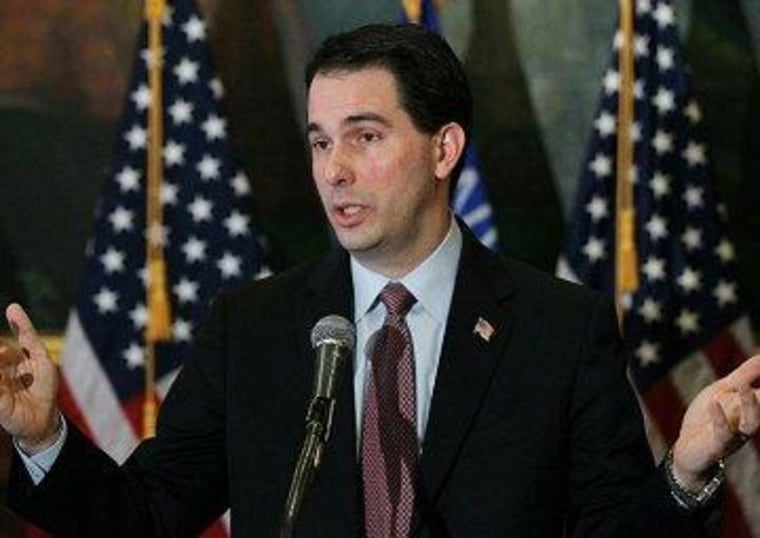With six Republican governors -- and counting -- embracing Medicaid expansion in their states, the issue has become something of a test for the party's various state chief executives: will arithmetic trump ideology or not?
To reiterate a point we've discussed, the way the Affordable Care Act is structured, Medicaid expansion is a great deal for states, and should be a no-brainer for governors who care about lowering health care costs, insuring low-income families, improving state finances, and helping state hospitals. But many Republican governors remain afraid of their party's far-right base, and don't want to be seen implementing a key provision of "Obamacare."
That list now includes Wisconsin Gov. Scott Walker (R), who yesterday became the 13th governor to reject the ACA's Medicaid expansion, despite the fact that the policy would have covered 235,000 of his low-income constituents with Washington picking up the vast majority of the tab.
But unlike the other 12 GOP governors, Walker's story comes with a twist. As Sarah Kliff explained, Wisconsin "is in a bit of a weird position."
Before the Affordable Care Act passed, it was one of just three states providing coverage to childless adults up to 200 percent of the federal poverty line ($22,240 for an individual). There are a few caveats here: The benefit package is more limited than what is offered to other Medicaid enrollees and it has had an enrollment cap since 2009, which means it limits the number of enrollees who use this coverage.Most states provide Medicaid coverage to pregnant women, the disabled and children. Some include low-income parents. But very few offer coverage to childless adults. That's why the health law's Medicaid expansion is such a big deal: It will expand coverage to everyone under 133 percent of the poverty line.
This might sound a little complicated, but here's the detail to remember: from Walker's perspective, Medicaid expansion is less important in his state because Wisconsin is going to cover a lot of the same folks anyway.
And what about those who don't? That's the politically interesting part.
For folks whose income would qualify them for federal Medicaid coverage under expansion, but make too much for Wisconsin's eligibility levels, Walker intends to use ... Obamacare.
Wisconsin Gov. Scott Walker, avowed Obamacare foe, proposed an ambitious plan Wednesday to cut his state's uninsured population in half -- by getting them covered through Obamacare.The Republican announced that he is rejecting Medicaid expansion and the billions of federal dollars that would come with it. In fact, he's proposing a net cut in the state Medicaid program.Walker would take thousands of people currently on Wisconsin's relatively generous Medicaid program -- people who are above the federal poverty level -- and move them into the Obamacare exchange instead, where they can get federally subsidized private insurance.
So Walker will rely on Obamacare in order to avoid implementing Obamacare.
Far-right activists will probably find this tolerable, though if the Wisconsin governor seeks national office in the future, this may be somewhat difficult to explain.
